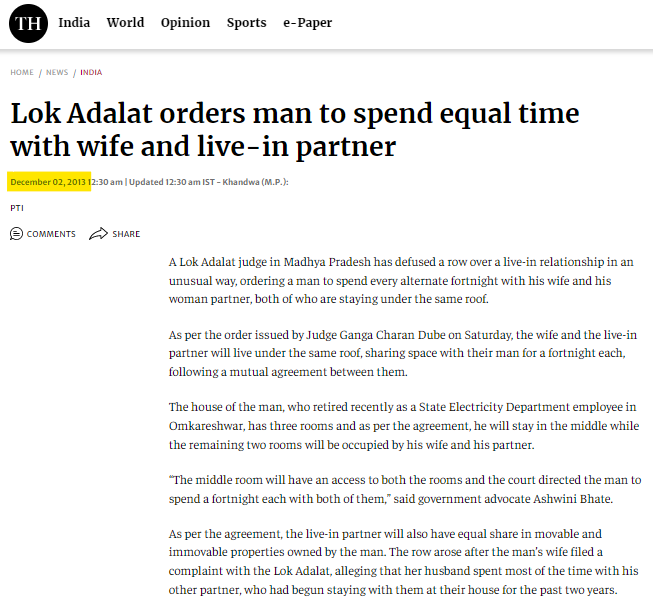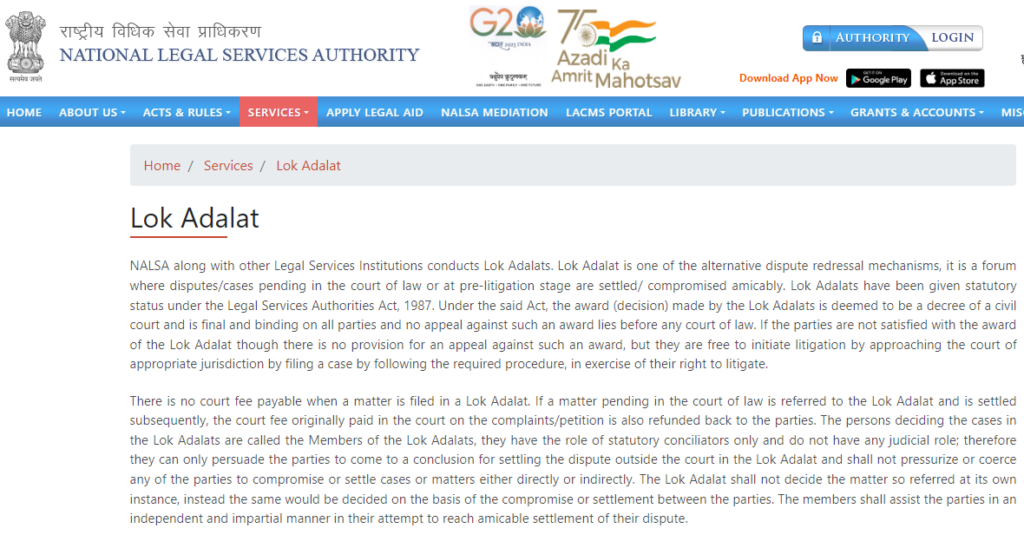A newspaper clipping is circulating on social media, claiming that a recent court ruling allows both the wife and girlfriend to cohabit in the same house. Let’s verify the claim made in the post.

Claim: A recent judgement by an Indian Court allows both the wife and girlfriend to live in the same house.
Fact: The post has been circulating since 2013, and it refers to a specific case that was resolved during a Lok Adalat proceeding in Khandwa district, Madhya Pradesh. The case involved a man, his wife, and his live-in partner. The Lok Adalat judge resolved the dispute by ordering the man to spend alternate fortnights with his wife and partner, who continued to live together under the same roof. However, it’s important to note that Lok Adalat decisions are case-specific and do not establish binding legal precedents. Hence the claim mad in the post is MISLEADING.
Upon conducting an internet search using relevant keywords, it has been found that the viral post has been circulating since 2013. A clear version of the news clip specifies that this incident took place in the Khandwa district of Madhya Pradesh during a Lok Adalat proceeding. The case involved a man, his wife, and his live-in partner.

Taking a cue from this, We searched for media reports to know more about this incident, and came across several prominent sources such as The Hindu, Aaj Tak, and Zee News. According to these reports, a disagreement arose due to a live-in relationship, leading the wife to file a complaint with the Lok Adalat in Madhya Pradesh. She claimed that her husband, who had been living with his other partner in their house for two years, was spending most of his time with her. However, the Lok Adalat judge, Ganga Charan Dube, came up with an unusual solution to resolve the issue.

Judge Dube issued an order that the man should spend every other fortnight with his wife and his live-in partner. Both the wife and the partner were to continue living together in the same house and share the space, while the man would stay in the middle room. To ensure fairness, the middle room would have doors connecting to both the wife’s and the partner’s rooms. The court directed the man to spend two weeks with each of them in rotation. Additionally, as part of the agreement, the live-in partner would have an equal share in the man’s belongings and properties. This unique decision by the Lok Adalat judge aimed to find a practical solution to the situation, considering the interests of all parties involved and promoting a harmonious living arrangement.
(In order to respect privacy concerns, we will refrain from disclosing the names of the individuals involved in this case.)
Lok Adalat is one of the alternative dispute redressal mechanisms, it is a forum where disputes/cases pending in the court of law or at the pre-litigation stage are settled/ compromised amicably. Lok Adalats have been given statutory status under the Legal Services Authorities Act, 1987. Under the said Act, the award (decision) made by the Lok Adalats is deemed to be a decree of a civil court and is final and binding on all parties. While Lok Adalats share some similarities with courts, such as the ability to resolve legal disputes, they function with a more informal and conciliatory approach. It’s important to note that the decisions made in Lok Adalats pertain to specific cases and do not set legal precedents that are binding on other courts.

To sum it up, a specific order delivered by a Lok Adalat court in 2013 for a particular case is being circulated on social media as a recent and generalized ruling by the court.



